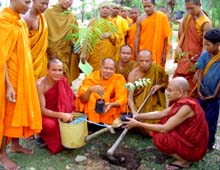| |
|
 |
Monks and nuns in Southeast Asia pledge to save their forests
June 16 2004:
 |
 |
 |
Participants pose after a tree-planting workshop, held during the forestry conference near Phnom Penh |
Five years ago it was “unimaginable” that such an event could have taken place at all.
But a unique meeting on Buddhism and the Environment in Phnom Penh not only highlighted a new confidence in the Cambodian Sangha (community of Buddhist monks and nuns) but also revealed a far greater commitment among Buddhists to manage the sustainable use of natural resources throughout South East Asia than any of the organisers had imagined.
This ground-breaking meeting involved Buddhists from Cambodia, Laos, Thailand and Myanmar sharing their experiences on environmental issues and their plans for the future.
One of the visible outcomes was a serious proposal to establish the South-East Asian Monks' Federation for the Environment, to be a formal voice of authority to represent the Sangha in promoting and supporting conservation policies from village to government level.
 |
| In the Cambodian province of Oddor Meanchay monks have confronted the issue of uncontrolled human settlement into virgin forest, by applying the traditional Buddhist rules of forest dwelling to the area. The two forests affected measure 10,000 hectares and 8,000 hectares respectively; they are habitats for tiger, leopard, guar, deer and also the site of valuable water sources. |
|
 |
 |
The less visible outcomes were just as powerful. The meeting gave the opportunity for regional monks and nuns – many of whom had been working independently on forestry and development projects - to meet for the first time other members of the Sangha who shared their commitment to the sustainable management of natural resources.
“This gathering was extraordinary,” said Joanne Robinson, project manager for the Alliance of Religions and Conservation (ARC), which with the World Bank, and Cambodian NGO Mlup Baitong , was one of the major sponsors and organisers of the event.
“There was a momentum and commitment that emerged at the meeting that we could never have anticipated,” she said.
The excitement was transmitted to the media. The conference attracted considerable interest not only from local press – with articles in both the English language Phnom Penh Post and the leading Khmer newspaper The Light of Asia – but also by national and international radio, including Radio Free Asia, Radio Australia and the Voice of America.
 |
| Although the Sangha Network will focus primarily in south-east Asia, this programme ties into the larger Asian Buddhist Network that is designed to link conservation and development activities in majority Buddhist countries and encourage strong Buddhist participation in civil society. The Asian Buddhist Network has received funding for conservation programmes in Mongolia and China from the World Bank Faiths and Bio-Diversity Programme.
|
|
 |
 |
A short documentary is being made by a programme called Rendevous for national Cambodian broadcast.
The 87 monks and nuns came from Cambodia, Laos, Thailand and Myanmar,
each country reflecting different experiences in relation to campaigning and action on environmental and development issues.
In addition there were representatives from 18 NGOs (including WWF Thailand, WWF Cambodia, Conservation International, Buddhism for Development, Save Cambodia’s Wildlife, Flora and Fauna International, WCS Cambodia and WCS Laos). There were also representatives from the World Bank and the Ministry of Environment of the Royal Government of Cambodia.
There were two goals for the conference, the first was to strengthen the environmental work done by monks and nuns through national and cross-border contact, the second to strengthen partnership links with NGO’s and development agencies and government bodies.
There has already been a high level of feedback since the conference – illustrating the commitment that was shown so powerfully at the event itself.
As a result of the meeting:
*several monks were considering establishing pagoda-based NGO’s.
* Community Forest International is now in discussion with monks to support a Buddhist-run forest protection programme in the Cambodian province of Oddor Meanchay.
* WCS Cambodia have contacted Mlup Baitong with interest to conduct a wildlife survey in the same area.
* Conservation International has initiated discussions related to freshwater and seawater turtles with monks living in the coastal Cardoman Mountains area.
* Save Cambodia’s Wildlife is meeting with ARC and Mlup Baitong this month to develop partnerships with monks on their education and community outreach programmes.
* Village Focus International has offered partnership training and support for monks on land legislation in selected communities that are at risk.
* The Sangha, ARC, Mlup Baiting, Spirit in Education and other NGO’s have pledged to develop further training programmes as part of the Sangha Network, having seen how this is a key factor in creating capacity and confidence in pagodas and villages.
As Venerable Ratana, one of the senior monks told ARC, "five years ago it was unimaginable that this sort of meeting could take place".
Find out about the Asian Buddhist Network
Associated links:World Bank
Mlup Baitong
Harvard Ecology Pages
Khmer Buddhist Educational Assistance Project:
|
 |
 |
|
|
|
|
|
 |
Asia projects
ARC is working in India, China, Cambodia, Mongolia and elsewhere, helping local faith communities protect their environment |
 |
Cambodia's Green Shade movement
Monks and nuns are spearheading the post-war revival of the country's environment |
 |
ARC and the Faiths
Faith communities are working in countless ways to care for the environment. This section outlines the basics of each faith’s history, beliefs and teachings on ecology. |
 |
 |
|
|

